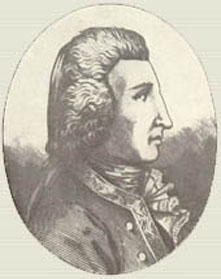| Baldassare Galuppi  Born: 18-Oct-1706 Born: 18-Oct-1706
Birthplace: Island of Burano, Italy
Died: 3-Jan-1784
Location of death: Venice, Italy
Cause of death: unspecified
Gender: Male
Religion: Roman Catholic
Race or Ethnicity: White
Occupation: Composer Nationality: Italy
Executive summary: Il Filosofo di Campagna Italian musical composer, born on the 18th of October 1706 on the island of Burano near Venice, from which he was often known by the nickname of Buranello. His father, a barber, and violinist at the local theater, was his first teacher. His first opera, composed at the age of sixteen, being hissed off the stage, he determined to study seriously, and entered the Conservatorio degli Incurabili at Venice,as a pupil of Antonio Lotti. After successfully producing two operas in collaboration with a fellow-pupil, G. B. Pescetti, in 1728 and 1729, he entered upon a busy career as a composer of operas for Venetian theaters, writing sometimes as many as five in a year. He visited London in 1741, and arranged a pasticcio, Alexander in Persia, for the Haymarket. Charles Burney considered his influence on English music to have been very powerful. In 1740 he became vice-maestro di cappella at St. Mark's and maestro in 1762. In 1749 he began writing comic operas to libretti by Goldoni, which enjoyed an enormous popularity. He was invited to Russia by Catherine the Great in 1766, where his operas made a favorable impression, and his influence was also felt in Russian church music. He returned to Venice in 1768, where he had held the post of director of the Conservatorio degli Incurabili since 1762. He died on the 3rd of January 1785.
Galuppi's best works are his comic operas, of which Il Filosofo di Campagna (1754), known in England as The Guardian Trick'd (Dublin, 1762) was the most popular. His melody is attractive rather than original, but his workmanship in harmony and orchestration is generally superior to that of his contemporaries. He seems to have been the first to extend the concerted finales of Leo and Logroscino into a chain of several separate movements, working up to a climax, but in this respect he is much inferior to Sarti and Mozart.
Robert Browning's poem, A Toccata of Galuppi, does not refer to any known composition, but more probably to an imaginary extemporization on the harpsichord, such as was of frequent occurrence in the musical gatherings of Galuppi's day.
Do you know something we don't?
Submit a correction or make a comment about this profile
Copyright ©2019 Soylent Communications
|